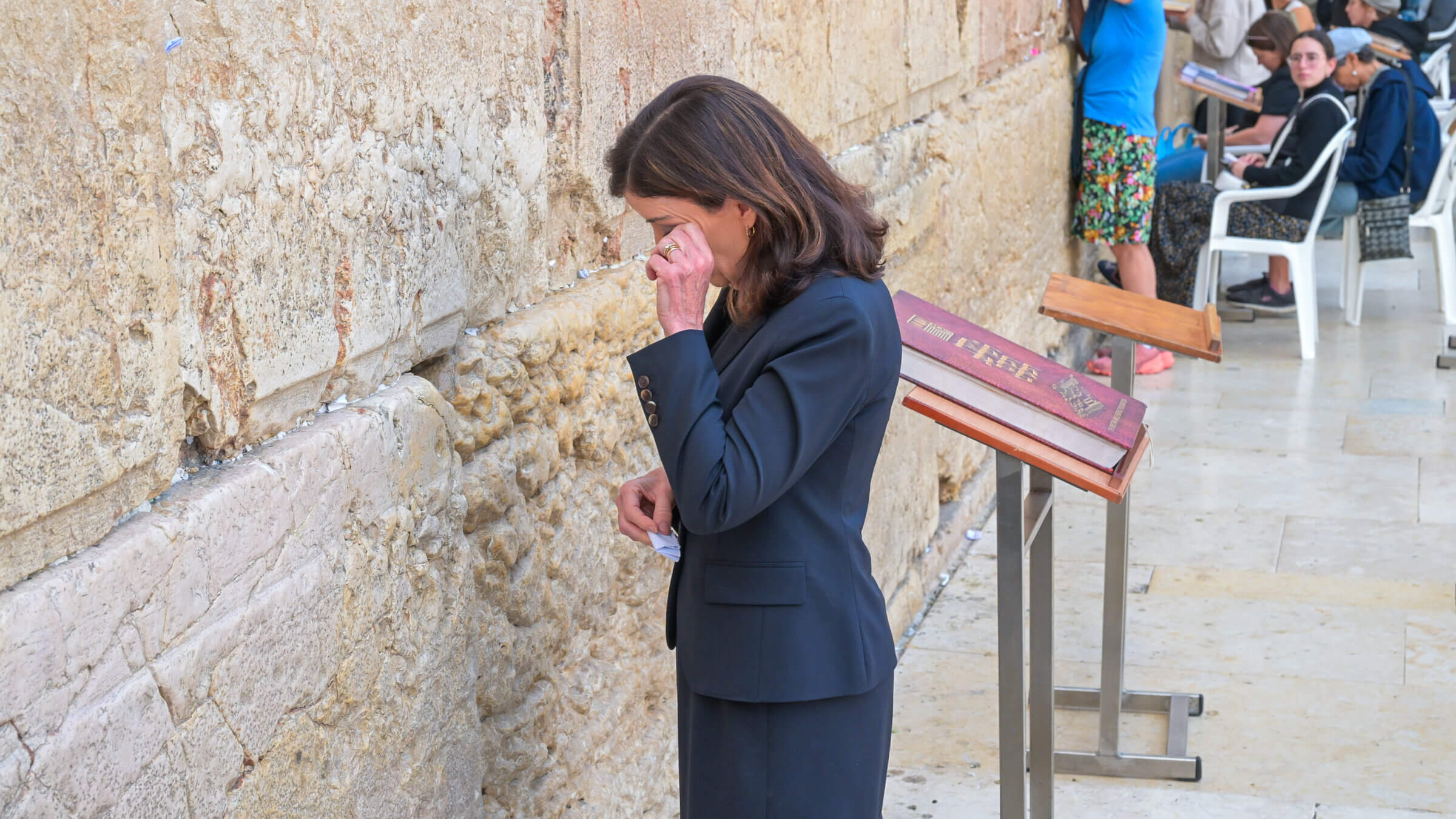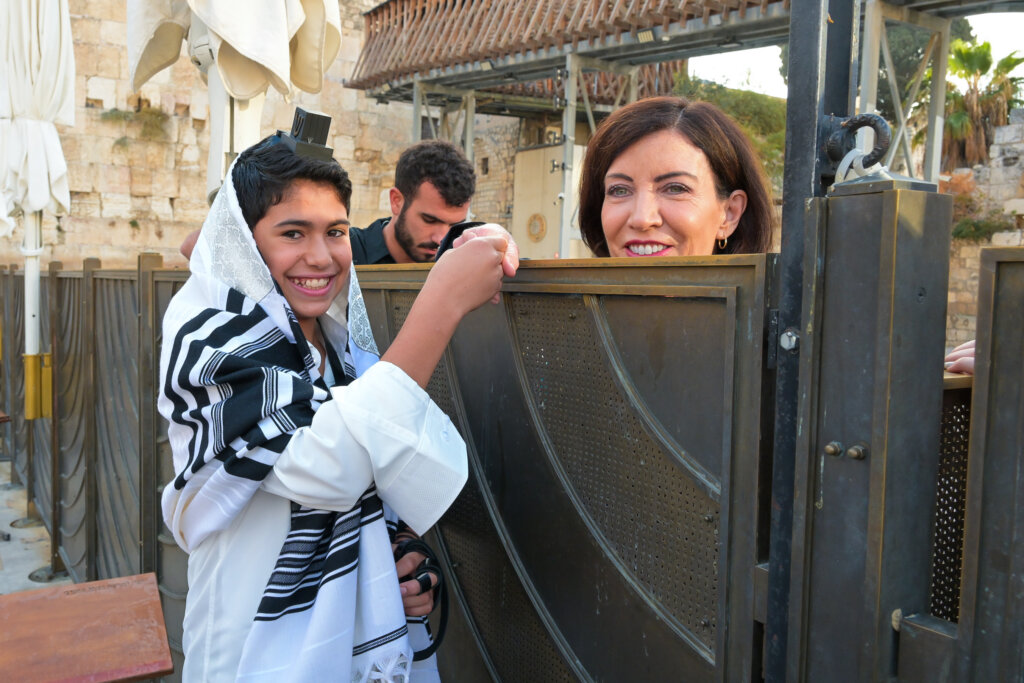On New York governor’s first day in Israel to support Hamas terror victims, her father dies in Florida
Gov. Kathy Hochul’s father had long encouraged her to visit Israel

New York Governor Kathy Hochul at the Western Wall in Jerusalem on Oct. 19, 2023. Photo by Shlomi Amsalem
New York Gov. Kathy Hochul is on her first-ever trip to Israel to grieve with the families of terror victims. But she is also grieving her own personal loss. On Thursday morning Israel time, she learned that her father, John Courtney, died suddenly from a brain hemorrhage on Wednesday night in Florida. He was 87.
Hochul, who arrived Wednesday evening on a two-day solidarity visit following the Hamas terrorist attack, dressed all in black on her first stop Thursday morning as she visited the women’s section of the Western Wall in the Old City of Jerusalem.
According to the pool reporter accompanying the governor, Hochul, 65, received condolences from her staff, which included her Jewish aides, Micah Lasher, a policy director; Jacob Adler and Eva Wyner, her director and deputy director for Jewish affairs; and Avi Small, her press secretary. “I love you guys,” she responded.
A note in the Wall
Hochul shed a tear as she placed a note in a crack in the Wall, a tradition. It referenced her father’s passing. She then placed her hand on the limestone and leaned in. She also prayed at the Church of the Holy Sepulchre, wearing a Jerusalem cross around her neck.
Hochul told the Forward last year that she was inspired to make a journey to the Jewish state by her father, an Irish Catholic who had visited Israel and had told her of his spiritual experiences there.
David Greenfield, chief executive of Met Council, who is accompanying Hochul, said he was “moved” by the governor’s “fortitude and compassion” as she “pressed on in her father’s memory” despite her loss and deep grief.

In her note at the Kotel, Hochul wrote a wish “that the arc of the universe bends toward justice” and prayed “for the victims of the Hamas attack on Israel, their families and all the innocent civilians lost as a result.”
New York leaders often visit the Jewish state during times of conflict. New York City’s Jewish population is the largest of any city outside of Israel.
Meeting survivors
After landing at Ben-Gurion International Airport Wednesday, Hochul visited Shefayim, a kibbutz hotel transformed into a shelter for Israelis from the south who were relocated after Hamas attacks on Oct. 7, in which the terrorist group killed more than 1,400 Israelis.
There the governor spoke to a father whose three children — ages 4, 8 and 10 — were kidnapped and being held captive by Hamas in Gaza, and to a 13-year-old girl who survived the attack as she hid in a safe room while most of her neighbors and friends were killed. She then visited the home of an Israeli family whose son, an IDF soldier, was killed while battling terrorists who had crossed into Southern Israel.
Hochul also toured a dining hall repurposed into a distribution center, where clothing and essential supplies were available for those who had left their homes with nothing. She visited a food pantry set up for displaced families and IDF soldiers. And she dropped off boxes of packed food at a hotel in the city of Ra’anana for those families. “You know there’s the prime minister of Israel? She’s the prime minister of New York,” the city’s mayor, Chaim Broyde, said, introducing Hochul to two young Israeli boys in Hebrew.
“I have seen the resilience of the Jewish people,” a visibly emotional Hochul said in a press gaggle, adding that she was “in awe of the strength and courage” they showed amid their pain.
Hochul on Thursday plans to meet with Israeli elected officials and business leaders and tour more communities targeted by Hamas.
Greenfield said he appreciated the governor’s “empathy” and “heartfelt leadership during the most challenging time for the Jewish community since the Holocaust.”
A message from our Publisher & CEO Rachel Fishman Feddersen

I hope you appreciated this article. Before you go, I’d like to ask you to please support the Forward’s award-winning, nonprofit journalism so that we can be prepared for whatever news 2025 brings.
At a time when other newsrooms are closing or cutting back, the Forward has removed its paywall and invested additional resources to report on the ground from Israel and around the U.S. on the impact of the war, rising antisemitism and polarized discourse.
Readers like you make it all possible. Support our work by becoming a Forward Member and connect with our journalism and your community.
— Rachel Fishman Feddersen, Publisher and CEO


























